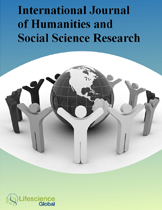ijhssr
|
|
|
Abstract: The agenda of Higher Educational institutions and other organisations reveals a growing concern with the extension and impact of research at the postgraduate level. Doctoral studies are thus acquiring a greater significance and value. The international and European context demonstrates the existence of an increasing number and a greater diversity of research students enrolling in postgraduate studies, particularly in doctoral programmes. Consequently, it is the purpose of this paper to examine doctoral education through the lenses of the Bologna Process. This perspective is chosen particularly due to the importance of Bologna at educational, political, economic, and social levels in Europe but also beyond. In fact, among other discourses, Bologna has been shaping the ‘trends’ relating to doctoral education. Alongside with Bologna Ministerial documents, others from some consultative members (the so-called ‘E4 group’) are analysed. In the last section, some main challenges to doctoral education are highlighted. Keywords: Higher Education, Bologna Process, Educational Policy, Doctoral Education. |
|
|
Abstract: After taking a somewhat biased and rather paternalistic approach towards human rights, the official teaching of the Catholic Church hurriedly converted to proclaiming such rights with great conviction, although in a much broader but less precise way. Nevertheless, there was a risk of adding error to error: the past “error” which did not consider the metaphysical reach of individuals’ natural rights (especially in terms of the duty to resist growing political power) and the present “error” which is broadly based on a way of thinking that tries to match needs with rights (very broad legitimization of the authority of the State but seriously compromising individual liberties). Unfortunately, the Social Doctrine of the Church, according to Popes, demonstrates the lack of the realism and the doctrine of natural law that the libertarian tradition has expressed to guarantee individual natural rights and freedoms. Keywords: Human rights, natural rights, Social Doctrine of the Catholic Church, individual liberties, libertarian tradition.Download Full Article |
|
|
|
Abstract: This literature review provides an overview of the employment experiences of visible minority immigrant women based on a critical review of the international English language peer-reviewed publications from 1980 to 2011.The overall goal of the review was to raise awareness and understanding of immigrant women’s employment experiences, health experiences, and the link between employment and health for this subpopulation. Approximately 126 papers articles were analysed. The key findings specific to women’s employment experiences are: 1) Economic welfare of immigrants continues to deteriorate with post-2000 arrivals to Canada facing much more occupational downward mobility than their 1990’s cohort; 2) Gender, ethnicity and immigrant status intersect to shape visible minority women’s employment experiences of deskilling, discrimination, and marginalization; 3) Collaboration is required with all three levels of government (federal, provincial, and municipal) employers, educational institutions, and community agencies to foster immigrant visible minority women’s economic integration in Canadian society. Keywords: Literature review, Employment, Visible minority women, Immigrant, Health. |
|
|
Abstract: Cluster-randomized clinical trials (CRT) are trials in which the unit of randomization is not a participant but a group (e.g. healthcare systems or community centers). They are suitable when the intervention applies naturally to the cluster (e.g. healthcare policy); when lack of independence among participants may occur (e.g. nursing home hygiene); or when it is most ethical to apply an intervention to all within a group (e.g. school-level immunization). Because participants in the same cluster receive the same intervention, CRT may approximate clinical practice, and may produce generalizable findings. However, when not properly designed or interpreted, CRT may induce biased results. CRT designs have features that add complexity to statistical estimation and inference. Chief among these is the cluster-level correlation in response measurements induced by the randomization. A critical consideration is the experimental unit of inference; often it is desirable to consider intervention effects at the level of the individual rather than the cluster. Finally, given that the number of clusters available may be limited, simple forms of randomization may not achieve balance between intervention and control arms at either the cluster- or participant-level. In non-clustered clinical trials, balance of key factors may be easier to achieve because the sample can be homogenous by exclusion of participants with multiple chronic conditions (MCC). CRTs, which are often pragmatic, may eschew such restrictions. Failure to account for imbalance may induce bias and reducing validity. This article focuses on the complexities of randomization in the design of CRTs, such as the inclusion of patients with MCC, and imbalances in covariate factors across clusters. Keywords: Experimental Design, Randomization, Cluster Randomized Trials, Multiple Chronic Conditions.Download Full Article |
|
|
|
Abstract: This paper highlights the contributions of ordinary citizens to the development of a developing country – Bangladesh. The article discusses the contributions made by two ordinary citizens of Bangladesh, Begum Rokeya Sakhawat Hossain and Khondker Azizur Rahman Salim, toward building the society. It is argued in this paper that the participation of ordinary citizens in the development of a society is important. While the elites of a society may lay down the strategy, and sometimes the policies for developing such a society, ordinary citizens on their own can, in fact, play an important role in those regards. This paper highlights the strategies adopted by those two common citizens. It also chronicles their sufferings, sacrifices and achievements. The paper concludes that while the contributions made by Begum Rokeya Sakhawat Hossain is celebrated, those of Khondker Azizur Rahman Salim remains unrecognised by the Bangladesh society. The paper adopts qualitative research method. Information about Begum Rokeya Sakhawat Hossain have been collected from works done by her and by others on her. Khondker Azizur Rahman was interviewed both in Dhaka, Bangladesh and Maryland, the United States, where he currently lives. Keywords: Ordinary Citizens, Contributions, Development, Begum Rokeya Sakhawat Hossain, Khondker Azizur Rahman Salim, Bangladesh. |





